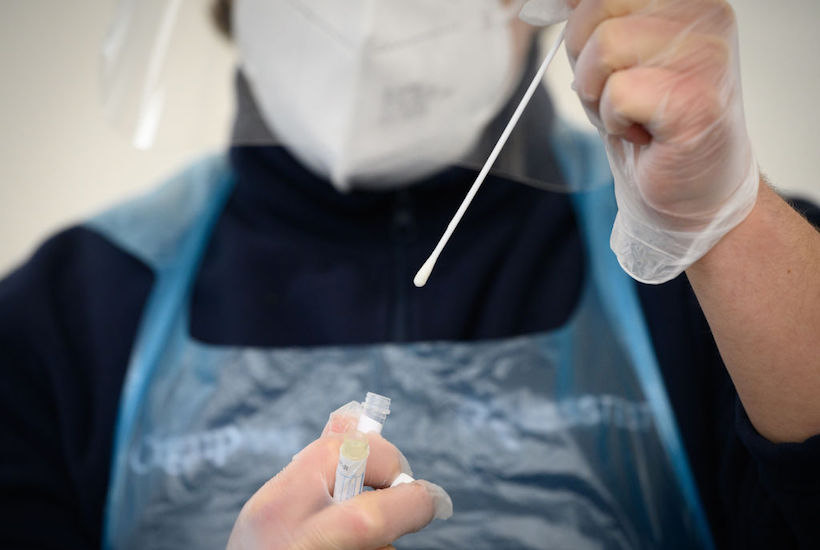With the revelation that passengers were barred from boarding the first repatriation flight to Australia from India on the basis of testing positive to coronavirus, only then to test negative two days later, serious questions should be raised about the effectiveness of such tests. In fact, a court in Austria recently cast doubt on reliance on PCR tests as justification for ‘anti-Covid’ measures.
On March 24, the Administrative Court of Vienna upheld an action against a ban by Viennese police on a planned public assembly
The rally was due to take place on Jan. 31, but was banned due to fears it could lead to an exponential spread of COVID-19.
In upholding the action, the judge reiterated that all people have a fundamental right to meet, and to protest freely and peacefully. This right cannot be infringed for any reason that is not in accordance with the law.
The judge hearing the matter, Doktor Frank, held that the reasons for banning the assembly had no basis in law and was invalid.
The prohibition on the gathering was put into place following declarations by Austrian health authorities, warning of the high transmissibility of the UK strain of COVID-19. There were also concerns from police, health officials, and security services that social distancing and mask-wearing requirements would not be respected attendees.
More significantly, the ban was further justified on the basis of an increasing number of positive PCR test results to COVID-19.
The judge reviewed the reasons given by the Austrian health authorities for the ban, focussing on their lack of clarity and terminological confusion in particular. The authorities listed numbers of cases, positive test results and infections as justification. The judge found that this approach was an inappropriate evaluation from an epidemiological point of view.
In this regard, he referred to the WHO Information Notice for IVD Users 2020/05, (Nucleic acid testing (NAT) technologies that use polymerase chain reaction (PCR) for detection of SARS-COV-2) of 20 January 2021, which states that a positive test result alone is no indicator of illness and must be considered with a series of other factors.
Thus, the judge declared that it was unclear what figures the health authorities were relying upon to justify the ban on public gatherings. This lack of clarity related to several factors: what were the number of test amplification cycles (the “molecular copying” of DNA fragments upon which the PCR test method is based), whether a person who returned a positive test result, but was asymptomatic, subsequently underwent a further test and was examined by a doctor to determine if he or she was ill or infected. This last point is significant since, as underlined by the judge, only doctors are professionally capable of diagnosing illness or infection.
Further, the judge referred to the statement by the inventor of PCR tests Dr Cary Mullis, who stated that PCR tests are not to be used for diagnostic purposes and do not of themselves indicate anything at all regarding whether a person is ill or infected.
The judge also referred to a 2020 study — Predicting Infectious Severe Acute Respiratory Syndrome Coronavirus 2 From Diagnostic Samples – PubMed (nih.gov), — where the authors affirmed that PCR tests are not determinative of illness. In this regard, the judge questioned the number of amplification cycles utilised in the tests, noting that after 24 such cycles, the test is practically useless for diagnostic purposes, since at that point they cannot demonstrate whether the virus is capable of reproducing itself and will result in false positives.
The WHO Information Notice admits as much in that “as disease prevalence decreases, the risk of false positive increases”. The judge also noted that numbers of positive test results where people are asymptomatic have an extremely high rate of error.
This was explained in a recent report by The New York Times, Your Coronavirus Test Is Positive. Maybe It Shouldn’t Be. The PCR test provides a simple yes-no answer to the question of whether a patient has the virus. To do so, the test amplifies genetic matter from the virus in cycles; the fewer cycles required, the greater the amount of virus, or viral load, in the sample. The greater the viral load, the more likely the patient is to be contagious. This number of amplification cycles needed to find the virus, called the cycle threshold, is never included in the results sent to doctors and coronavirus patients, although it could tell them how infectious the patients are.
In three sets of testing data that include cycle thresholds, compiled by officials in Massachusetts, New York and Nevada, up to 90 per cent of people testing positive carried barely any virus, a review by The New York Times revealed. Tests with thresholds so high may detect not just live virus but also genetic fragments, leftovers from infection that pose no particular risk — akin to finding a hair in a room long after a person has left.
The judge found that exclusive reliance by Austrian health authorities on PCR and antigen test results to justify their actions, was not sufficient epidemiological justification in the circumstances.
Accordingly, the court held that the police and health authorities had not established a valid basis for prohibiting the assembly.
Frank added, tellingly, that fear alone could not justify blanket prohibitions, especially when they relate to a right so fundamental as freedom of assembly.
The significance of this decision cannot be underestimated. It goes to the very basis of the justification for authorities to implement lockdowns and other restrictions on individual liberty, which the court found lacked support from a scientific and epidemiological perspective.
Lord Sumption in Britain has been consistently arguing against lockdown measures for the best part of a year on this basis as well as others.
Appeals against restrictions on freedom of movement and assembly, justified on the basis of positive PCR test results, have been lodged in courts in Berlin and Rome. The Austrian decision will no doubt be of major assistance in these cases.
Rocco Loiacono is a Senior Lecturer at Curtin University Law School. This article was compiled in collaboration with Eva Wiesmann.
Got something to add? Join the discussion and comment below.
Get 10 issues for just $10
Subscribe to The Spectator Australia today for the next 10 magazine issues, plus full online access, for just $10.

























Comments
Don't miss out
Join the conversation with other Spectator Australia readers. Subscribe to leave a comment.
SUBSCRIBEAlready a subscriber? Log in